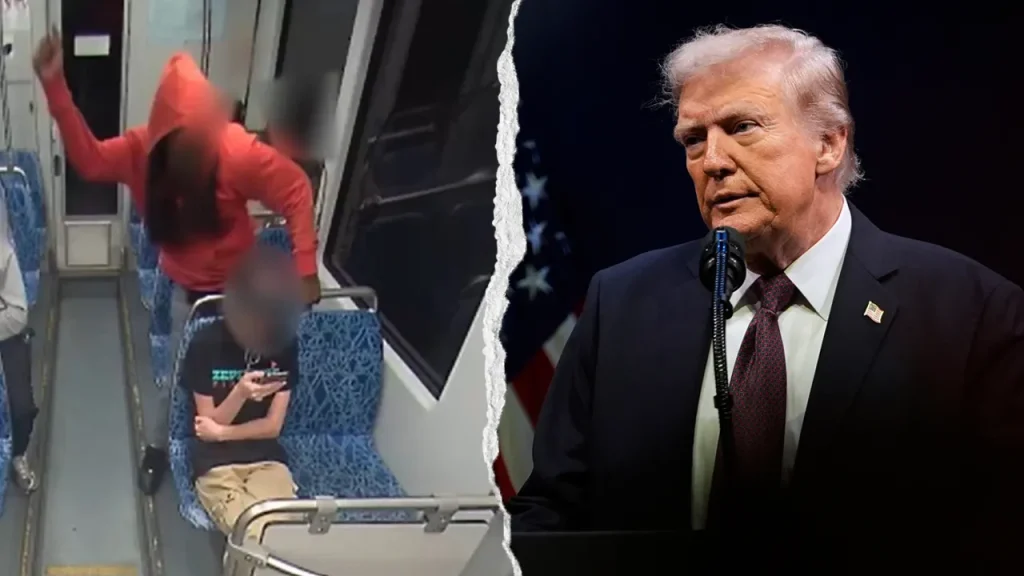The Tragic Murder of Iryna Zarutska: A Political Flashpoint in American Justice Debate
In a heart-wrenching tragedy that has sent shockwaves across the nation, 23-year-old Ukrainian refugee Iryna Zarutska was brutally stabbed to death last month while riding Charlotte’s Lynx Blue Line. The horrific attack, captured on surveillance footage released by the Charlotte Area Transit System, shows Zarutska boarding the train moments before being randomly attacked by a man who stabbed her three times, including a fatal wound to her neck. The suspect, 34-year-old Decarlos Brown, was arrested and charged with first-degree murder in what police have described as a completely random attack. What has intensified public outrage is Brown’s extensive criminal history spanning more than a decade, including previous charges of felony larceny, robbery with a dangerous weapon, and communicating threats, raising painful questions about why someone with such a record was free to commit such a violent crime.
The tragedy has quickly transformed into a heated political debate, with former President Donald Trump forcefully weighing in on the incident. “The blood of this innocent woman can literally be seen dripping from the killer’s knife, and now her blood is on the hands of the Democrats who refuse to put bad people in jail,” Trump declared on Truth Social, specifically targeting former North Carolina Governor Roy Cooper. Trump’s comments highlight his longstanding “law and order” position while directly connecting the tragedy to what he characterizes as lenient Democratic policies on crime and bail. In another statement, Trump emphasized that Brown “was a well-known career criminal, who had been previously arrested and released on CASHLESS BAIL in January, a total of 14 TIMES,” expressing disbelief that someone with such a record could be freely walking the streets and riding public transportation.
The timing of this tragedy has made it particularly significant in North Carolina politics, as it comes amid the lead-up to next year’s U.S. Senate race where former Democratic Governor Roy Cooper and Republican National Committee Chairman Michael Whatley are the leading contenders. The National Republican Senatorial Committee quickly echoed Trump’s sentiments, claiming Cooper’s policies “kept violent criminals like this on the streets instead of in jail where they belong.” Whatley himself declared on social media that “a vote for Roy Cooper is a vote for more crime, more violence, more criminals,” later adding that Trump was “spot on” in his assessment. “My far-left opponent Roy Cooper’s spineless, soft-on-crime policies have unleashed predators like Decarlos Brown Jr. and countless other violent thugs who unleash hell on innocent people because they know they’ll face no real justice,” Whatley stated, drawing a direct line between Democratic governance and public safety concerns.
The Democratic response to this tragedy has been notably slower and more measured. North Carolina’s current Democratic Governor Josh Stein faced criticism for his delay in addressing the incident, only commenting after the surveillance video was released and public pressure mounted. “I am heartbroken for the family of Iryna Zarutska, who lost their loved one to this senseless act of violence, and I am appalled by the footage of her murder,” Stein eventually posted on social media. Rather than directly addressing the criticisms about criminal justice policies, Stein pivoted to his own public safety agenda: “We need more cops on the beat to keep people safe. That’s why my budget calls for more funding to hire more well-trained police officers.” He further urged the legislature to pass his law enforcement recruitment package to address vacancies in state and local agencies. Meanwhile, Cooper’s campaign did not immediately respond to requests for comment, and a review of his social media accounts showed no posts addressing the tragedy.
The case of Iryna Zarutska is tragically emblematic of broader debates happening across America about criminal justice reform, public safety, and immigration. As a Ukrainian refugee who came to the United States seeking safety and opportunity, her death raises painful questions about the nation’s ability to protect its most vulnerable residents. The video footage of the attack has sparked particular outrage, with its graphic nature bringing the abstract debate about crime policies into stark, horrifying reality. During a visit to the Museum of the Bible in Washington D.C., Trump offered a more somber reflection on the tragedy, saying, “We’re all people of religion, but there are evil people. And we have to confront that.” This statement, while less politically charged than his earlier comments, still frames the issue as one requiring a more aggressive approach to dealing with violent offenders.
As the 2024 election cycle heats up, Zarutska’s murder will likely remain a powerful touchpoint in debates about criminal justice policy, with Republicans using it to reinforce their tough-on-crime messaging while Democrats navigate between acknowledging public safety concerns and defending progressive reforms. What remains undeniable amidst the political posturing is the profound human tragedy at the center of this case: a young woman who fled war in Ukraine only to meet a violent end in a country where she had sought refuge. Her story highlights the complex intersections of immigration, criminal justice, and public safety that continue to challenge American society and politics. While partisan battles rage on, the ultimate measure of any policy approach must be its effectiveness in preventing such senseless tragedies and ensuring that all residents—regardless of their origin—can live without fear of random violence.















